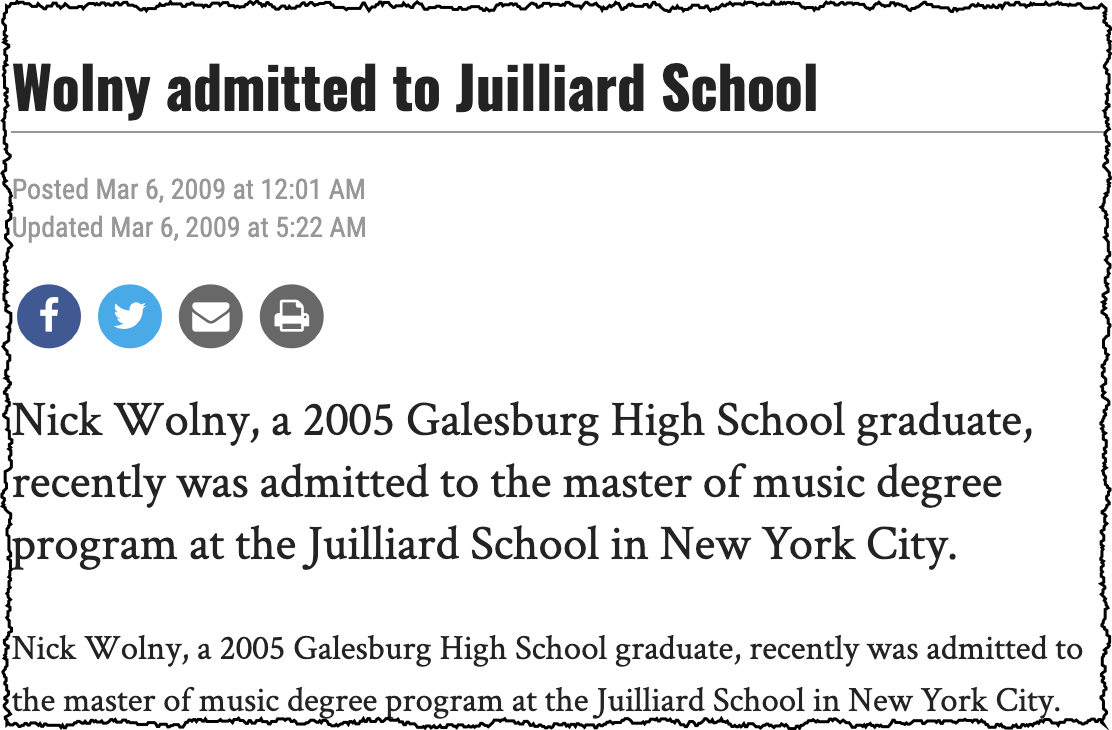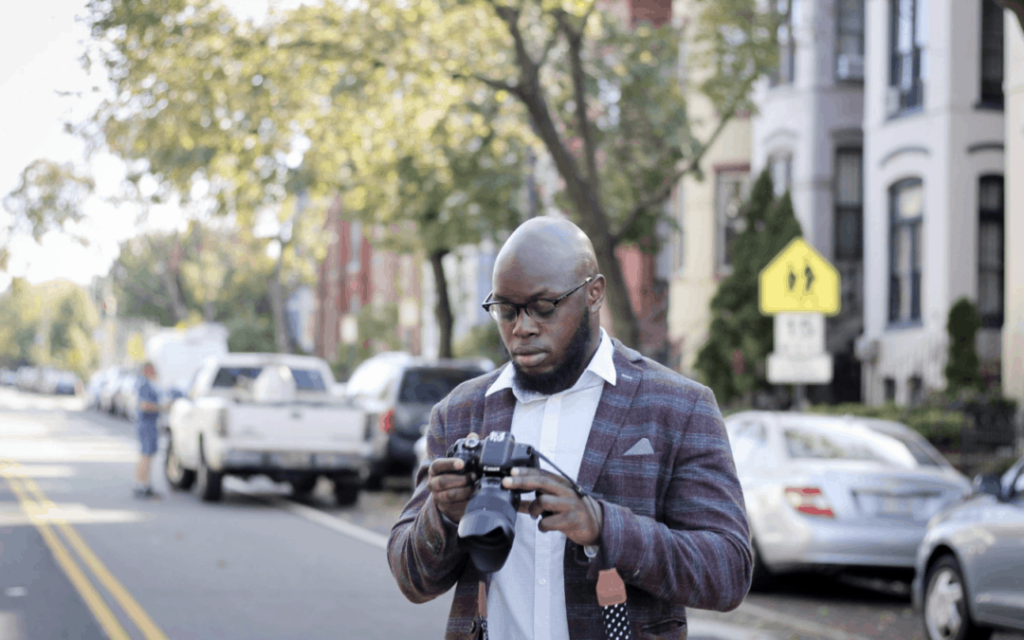February 7th, 2009 should have been a trophy-snatching milestone, a thrilling victory for my art and my craft. Like most 21-year-olds, I had no money, no safety net, and no answer to the question “How many shots of Jagermeister is too many?” (The answer, especially once you reach your thirties, is one.) What I did have was a dream.
I had basically abandoned the college experience and locked myself in a practice room for seven semesters straight: No Spring breaks, no vacations, no weekends off, no friendships forged. I even took on my professor’s challenge to me that “to really make it, I shouldn’t attempt to date anyone.” In retrospect, the dynamic was pretty messed up.
5 Creativity Exercises To Keep Your Writing Sharp - Post Outline
It was… extreme at times. But it was worth it. February 7th, 2009 was the day I was admitted to the Juilliard School to study classical music at the graduate level.

I ended up not going to Juilliard, because right around that time, this little skid called the great recession was happening, and economic stability was basically disintegrating beneath our feet. “We have no financial aid available for our new students” summarizes the phone call I received from their admissions office. Thankfully, I had auditioned at other schools and had a scholarship on the table to a comparable conservatory, a fancy word for “music college for nerds”.
Grad school at a top-tier music conservatory was tough. But it wasn’t because the competition was fierce. Pursuing music at the professional level meant I had to monetize and systematize my creative energy. It was no longer about how quickly you could play scales or arpeggios cleanly just to see what you were made of; I now needed to be that facile in order to be employable.
Suddenly, playing music could no longer be a pastime. It had to be perfect, surgical, and creative on command, and eventually my love for music began to wither and die away.
Why Writers Looking To Monetize Often Burn Out
I’m having deja vu, because here I am, over ten years later, monetizing my creativity once again with a writing-dominant approach to business marketing. Clients usually find me, sign with me, and retain me for my writing and my creative approach. Or I pitch them, give them a killer proposal, and let my past media portfolio do the talking.
Either way, when my creative writing juices are flowing, clients are pumped and I’m having a blast. When I’m stuck, however, it’s a different story.
The pandemic is not helping. In fact, studies have shown that our brains diminish in performance and problem-solving capacity when we’re burdened by chronic stress. Without ways to keep your fire burning bright, it’s only a matter of time before the stress catches up with you and your excitement begins to snuff out.
If writing is your gig — or you want it to be in the future — the pressure is constantly on to deliver fresh, new solutions on a regular basis. Help yourself unleash more winning ideas with one or all of these five exercises designed to bolster creativity.
#1: When You Get Stuck, Embrace Free Writing
A common obstacle to creative problem solving is that we’re editing for quality from the start; our standards are too high during what should be a messy, sloppy idea generation phase.
To fully unpack your thoughts, consider a flow state activity like free writing. Free writing was formally defined by Peter Elbow in 1973, but obviously writers have been using it for centuries to encourage flow. Free writing forces you to write continuously, which taps into your stream of consciousness and overrides your tendency to censor and filter your ideas.
I thrive on pressure… and also terror. If this is you as well, consider using Squibly’s “Most Dangerous Writing App” to turn up the heat. This free desktop app lets you assign a length of time to write about a prompt or a topic of your choosing continuously. if you pause for more than five seconds, however, everything you’ve written will be erased. If you need to shatter writer’s block, this unorthodox approach may do the trick.
#2: Race The Clock With Time Tracking
Do you respond well to friendly competition or contests? If the answer is yes, gamification may help with productivity, especially during a time when many of us have less structure than we’re accustomed to.
We know whitespace does wonders for creativity, so instead of trying to rearrange your to-do list into some sort of impossible origami solution, just learn to write faster. Way faster. Consider using a timer or time-tracking software to measure your output and race against the clock. Toggl is free to use and has a browser plugin for easy start/stop access when you’re feeling inspired to put blinders on and get the job done.
What’s the best length of time for exercises like this? Short answer: Ninety minutes or less. Long answer: Read this article.
#3: Tap Into Brain Science With "Mindstorming"
In “Mindstorming”, a technique I first heard about from personal development guru Brian Tracy, you write down a problem, then brainstorm twenty unique solutions. Tracy points out that the first five solutions usually come easily, the next five are more challenging, and the last ten are downright excruciating. This deep work stretches your creative thinking and can encourage you to generate more ideas that you can reference down the line.
#4: Get Nonverbal Via "Sketchnoting"
Why be bound by words? Sketchnoting refers to note-taking or information processing that incorporates shapes, arrows, containers, or other visual representations. This might be your thing if your writing often centers around systems, structures, or mental models.
Dr. Betty Edwards notes in her book Drawing On The Right Side Of The Brain that verbal function and cognition mainly live in the brain’s left hemisphere, while visual function is processed in the right hemisphere. If you need to get your creative gears turning, sketchnoting possible solutions through conceptual shapes and structures may help unlock new and fresh ideas.
You’ll feel happier, too. Science says so. A study from Drexel University found this artistic approach even lights up our reward pathways, making us feel more accomplished and motivated.
#5: Abandon Screens Altogether And Do Something Offline
Simply put, there are more thinking-centered jobs than ever before. According to the Pew Research Center, from 1980 to 2015 jobs that required analytical and social skills increased by 94%, whereas manual labor and jobs contingent on physical skill rose by 12%. We also know from a dump truck’s worth of research that an abundance of screen time, however, can actually increase stress and anxiety and erode focus.
Incorporate something hands-on into your day. Even if it’s a chore like organizing your closet or deep-cleaning areas of your living space, you’ll rebalance your brain and come back to your workload fresher than if you just try to plow through. In a famous CBS News interview, neuroscientist Kelly Lambert coined the term “behaviorceuticals” to describe how certain offline behaviors were capable of altering brain chemistry just as much as their pharmaceutical counterparts.
Creativity is the fuel that will power your writing career and pursuits. But if you only “write when you feel like it,” you’ll have a harder time handling the deadlines and expectations that come with having writing clients. Fill your toolbox with exercises that can light up your creativity on command and you’ll find yourself pumping out words and articles with more quality and ease.
Thanks for reading. 🙏🏼
Keep up the momentum with one or more of these next steps:
📣 Share this post with your network or a friend. Sharing helps spread the word, and posts are formatted to be both easy to read and easy to curate – you'll look savvy and informed.
📲 Hang out with me on another platform. I'm active on Medium, Instagram, and LinkedIn – if you're on any of those, say hello.
📬 Sign up for my free email list. This is where my best, most exclusive and most valuable content gets published. Use any of the signup boxes in this article, or go to the newsletter page here.
🏕 Up your marketing game: Camp Wordsmith™ is my business and writing program for small business owners and online entrepreneurs. Get instant access to resources and templates guaranteed to make your marketing hustle faster, better, easier, and more fun. (It's also "glamping"-themed – who doesn't love luxurious camping?!) Learn more here.
📊 Hire my marketing company: Hefty Media Group provides consultation and done-for-you services in content marketing. We're a certified diversity supplier with the National Gay & Lesbian Chamber of Commerce, and we'll make you sound damn good via the written word. Learn more here.
© 2021, 2022, Hefty Media Group. All Rights Reserved.


